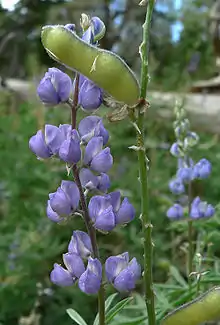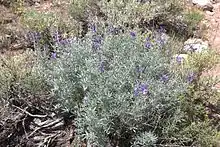Lupinus argenteus
Lupinus argenteus is a species of lupine known by the common name silvery lupine.[1] It is native to much of western North America from the southwestern Canadian provinces to the southwestern and midwestern United States, where it grows in several types of habitat, including sagebrush, grassland, and forests. This is a perennial herb growing erect to heights anywhere between 10 centimetres (3.9 in) and 1.5 metres (4.9 ft). It is sometimes silvery-hairy in texture and sometimes nearly hairless. Each palmate leaf is made up of 5 to 9 leaflets each up to 6 centimetres long. They are narrow and linear in shape, under a centimetre wide. The inflorescence bears many flowers, sometimes arranged in whorls. The flower is 5 millimetres (0.20 in) to 14 millimetres (0.55 in) long and purple, blue, or whitish in color. The banner, or upper petal, of the flower may have a patch of white or yellow. The fruit is a hairy legume pod up to 3 centimeters long containing several beanlike seeds.
| Lupinus argenteus | |
|---|---|
 | |
| Scientific classification | |
| Kingdom: | Plantae |
| Clade: | Tracheophytes |
| Clade: | Angiosperms |
| Clade: | Eudicots |
| Clade: | Rosids |
| Order: | Fabales |
| Family: | Fabaceae |
| Genus: | Lupinus |
| Species: | L. argenteus |
| Binomial name | |
| Lupinus argenteus | |
